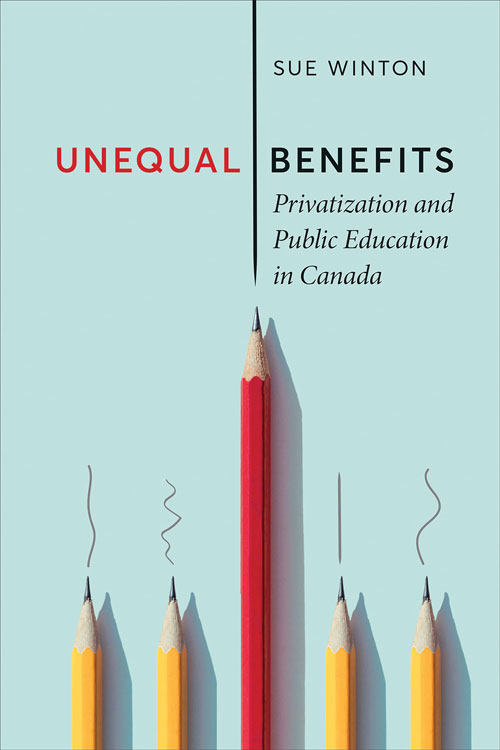A robust public education system is a point of pride in Canada. While the vision that education researcher Sue Winton refers to as “the public school ideal”—a free, universally accessible system that provides equal opportunities to all learners, with the public good as its central value—has never been perfectly realized, it’s one we must continually aspire to if we want to create a more just society. However, as Winton, a professor of education at York University, makes clear in Unequal Benefits, a variety of factors are leading to the increased privatization of K–12 education. Privatization erodes the founding principles of public education and moves us further away from the public school ideal.
Education privatization is a global phenomenon but it plays out differently in local policy contexts. Winton’s book illuminates some of the trends happening across Canada, such as an increased emphasis on fundraising and school fees, while also touching on developments that are unique to particular provinces, such as charter schools in Alberta.
Winton approaches her topic through the lens of critical policy analysis. Unlike traditional policy analysis, which examines whether policies are effective at achieving their goals, critical policy analysis looks at how policies either create, perpetuate or challenge unequal social relations; in other words, which groups benefit or are disadvantaged by a policy. She finds that education privatization disproportionately benefits those from more advantaged backgrounds, and that parents are to some degree complicit in seeking to secure advantages for their children through practices such as fundraising and advocating for programs of choice.
Privatization seeps into public education in many ways. Winton focuses on fundraising, student fees and the recruitment of international students as policies that school authorities use to generate revenue in the face of limited government funds. She then devotes a chapter to school choice policies and how these disproportionately benefit white and affluent families, who are better positioned to navigate the system to secure advantages for their own children.
Reflecting on our role in privatization practices and policies can be an uncomfortable experience for parents, as virtually all of us are to some degree implicated in the practices Winton identifies. Nevertheless, Winton makes a convincing case that only by understanding our own role in these systems can we advocate for more equitable education for all children. The chapter on taking action contains concrete suggestions for how parents and the public can advocate for practices that uphold rather than undermine the public school ideal.
Unequal Benefits is an important resource for anyone interested in issues of education funding and privatization. Winton states that she wrote it not only for policymakers but for parents and members of the public who want to better understand some of the issues they’re seeing in K–12 education. As a parent and a public education advocate without an academic background in education policy, I found the book quite accessible. I’d encourage anyone interested in these issues to read the book, but feel free to read selectively; while academics and policy experts may be interested in the sections on critical policy studies, others can skip these, while still finding much to reflect on in other chapters.
As with so many public institutions, public education is under increasing pressure from privatization forces. Winton’s book provides a timely overview of the Canadian context, as well as suggestions for meaningful action for those who believe public education is worth fighting for.
Heather Ganshorn is the treasurer and research director with Support Our Students Alberta.
_______________________________________


